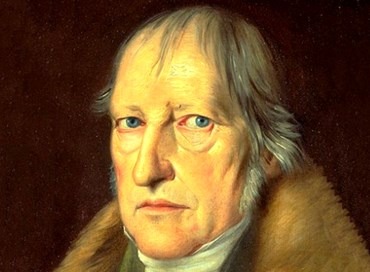Man belongs to Nature and to History? Only to Nature? Exclusively to history? With Georg Wilhelm Friedrich Hegel doubts fly. Man is historical. Indeed, History is man, the individual is immersed in the procedures of the Spirit like a frost on the grassy mountain. The Spirit what is it, God? No, the Spirit is theSelf-awareness that reality has of itself, the recognition that there is aDark ideanebula, total which, like one Cosmic mother, gives birth to Nature. Here, the Idea becomes aware of the existence of an object: if there is no object, one is not possible consciousness. But if there is consciousness we overcome the nebulous state, the Idea. We come to the subject (Idea) who knows an object (Nature). In this way, the Idea becomes conscious of Nature and becomes Spirit.
The Spirit is, therefore, the wholeness who is aware of himself as a subject-object. Trivializing: the mind looking at the body. But we are at the beginning. The Spirit is overflowing with accomplishments. Polymorphic, incarnate, he dresses, undresses, dresses, now takes shape in individualsnow in supra-individual entities, now in its most eminent ones spiritual characterizations (the spirituality of the spirit, art, religion, philosophy) while in its incarnation in community entities it has the aspect of the family, of society, of the State.
The State. Hegel dotes: he is German. The Duty and the State (in the State)! He becomes (almost) pindaric to appoint the state. Who is the man, the subject, the individual without it State? You would lack ethics, “meaning”. The Prussian state even it is the fulfilling expression, full of statehood. It is the God State on earth. And that he proves to be mighty and warrior is a perfective, indispensable completion. Hegel is of a realism Hun. The strongest is the strongest, if he can be strong. Here she is rationality. Not the individual debating how to behave, but the affirmation of state power even in war, with war. This is the actual rationality.
“Every rational is real. Every real is rational“. Therefore, if it is affirmed, if it has the strength to become reality, what is implemented must contain a reason for having affirmed itself. So, in fact, it is rational. There is a reason for his claim. Terrifying. Very clear. We need to understand the reasons for what is taking place and understand them. Not consider “irrational” what happens. If it happens it has reasons. If it becomes reality it has reasons and is therefore rational (the term “rational” does not mean good reasons but reasons, motivations). Facing reality as it is, having the courage and the awareness.
Hegel re-proposes, imposes a procedure of reality invented by the Greeks but that They suprematizes: the dialectic. Dialectic is interlocution, saying and replying, the pros and cons, Sic et non from Abelardthe Videtur quod non sed contra from Thomas (to be distinguished, of course) but it is also above all the become of the lightning Heraclitus. Struggle, conflict, nothing exists that does not have an opposite. Nothing can be defined if by its opposite, we say night what is not day, light what is not dark. And that’s not enough: everything that exists denies itself continuously. The living being dies, the water runs, the wind does not stop, life passes, nothing is still in itself.
Light, dark, day, night, but the night becomes morning so it is self-dialectic, change, negation. This is reality: an assiduous becoming, a contrast, an overcoming, an increase. And yet, the dialectic, the sumptuous becoming that is filled with every contrast, assumes it, surpasses it, subsides in the state! A lot of noise from East to West (!) And to conclude that it is Prussian state is the point of arrival of the story.
At least Giambattista Vico indicated a very distant destination (the Eternal ideal story) instead Hegel shakes the world mountains from East to West, to mark the arrival point in the Prussian state! He had mockery and rudeness of it and, paradoxically, a philosophy so adverse that he altered philosophy as They had altered the previous one.
Imperial developments, among those who overturn it by accepting its dialectic “materializing it” (Karl Marx) and those who completely erase it (Søren Kierkegaard, Arthur Schopenhauer, Friedrich Wilhelm Nietzsche, Max Stirner). But man like historical subject and totally historical aimed at the triumph of the West has in Hegel the most systematic conceptual singer (with Marx). Personalities that in various ways allow you to take into account and understand, not to have an opinion, because you have a head.
Georg Wilhelm Friedrich Hegel Hegel was born in Stuttgart in 1770 (the same year as Ludwig van Beethoven, dialectical musician like no one). Unsurpassed era of German culture. Hegel was passionate about theological studies, his conception is basically a immanent providentialism, it is not God who guides the events but the “rational” development in the sense of the Spirit. He liked to study and teach, he is among the characters “born professors”: Private tutor, teacher in Jena, then finally in Berlin. He married and had a calm home life. In his family he belonged to the bourgeoisie and the civil society that he appreciates has as its model bourgeois society. Admired Napoleon, since although he was a philosopher of the evolution of civilizations, he did not eliminate the presence of personalities. Necessarily. It would be worth reading what the most consistent character (with Beethoven and Luther) of German civilization writes about Hegel, Johann Wolfgang von Goethe, ironic and surprised. But Goethe was a German-Greek, Hegel a historicist theologian. L’art in Hegel it was inferior to philosophy, the latter would constitute the self-awareness that the process of the Spirit has accomplished. Fatal mistake. Art is consciousness and feeling, it is the doubling of life. It contains conceptuality but makes it vital, not just knowledge. It is an essential point to define modernity.

